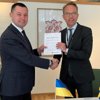-

AI detects tumor disease – via voice recording
A short voice recording along with facial images – both analyzed with an AI algorithm – can make it possible to detect the rare tumour disease acromegaly and initiate treatment at an early stage.
-

Large study: The benefits and risks of obesity medications
Medications such as Ozempic can reduce the risk of a range of different diseases and health conditions but also increase the risk of others. This is according to a large American study where the connections between GLP-1 receptor agonists and the risk of a variety of health outcomes have been examined.
-

Roche’s Genentech terminates licencing deal with Norwegian biotech
Genentech is ending a license collaboration with Norwegian biotech Nykode Therapeutics regarding a clinical stage cancer vaccine program.
-

Obesity-drug pioneers win Lasker Award
This year’s Lasker Prize in Clinical Research has been awarded to three researchers for their discoveries in GLP-1-based drugs that, according to the jury, “have revolutionised the treatment of obesity”. Among others, Novo Nordisk’s Lotte Bjerre Knudsen is honoured.
-

Anna Törner: ”Mom, do you think you’ll ever get married again?”
”I realize I’m slowly descending into that familiar statistical rabbit hole, where life’s biggest uncertainties are reduced to point estimates and confidence intervals”, Anna Törner writes in a column.
-

“We should avoid surgery if we can”
Since February this year, she has been Scientific Director Life Science at the Karolinska Institutet. Life Science Sweden met Anna Martling for a talk about role models, surgery and Sweden’s strengths and weaknesses in medical research.
-

Studie: Hjärtbox gav färre komplikationer än kylväska vid transplantation
En svenskutvecklad metod för att förvara donerade hjärtan inför transplantation minskar risken för patienten att drabbas av tidig hjärtsvikt, enligt en ny studie från bland annat Göteborgs universitet.
-

“Conducting research at universities is becoming more and more like working at a research hotel”
The government wants Swedish research to focus on excellence and innovation, but can the two be combined? Life Science Sweden talks to Anna Falk, a professor at Lund University, about research policy, the constant hunt for funding in academia and what constitutes ‘fine research’.
-

KI’s freezer fiasco investigated: A chain of failures
A chain of combined technical and organisational shortcomings caused the freezer breakdown at the Karolinska Institute during the Christmas holidays, destroying more than 47,000 samples. This was the conclusion of an internal investigation.
-

”We need compatibility“
Penilla Gunther, founder of Fokus Patient and chair of the European Patient Safety Foundation, hopes that the forthcoming life science strategy will focus on efficient and secure management of patient data and equal access to medicines.
-

Anna Törner: ”Orphan Designation – the "petite robe noire" of drug development”
It is easy to cling to various regulatory incentives, like orphan designation, and other expedited pathways, without understanding what they truly mean or whether they are indeed right (or wrong) for the current project, Anna Törner writes in a column.
-

“Don’t postpone the transition to IVDR”
message: don’t postpone the transition.
-

To build trust, one must be able to say “I don’t know” – whether human or AI
Will AI strengthen or break down trust? It depends on whether we can understand and accept its limitations, and our own, writes Sarah Lidé in a column.
-

Failed to read the fine print – lost his life’s work
A celebrated CEO and co-founder of a pioneering lab company one moment – the next, fired, kicked out and written out of the company’s history. This is the story of a Swedish entrepreneur who was going to raise US venture capital to strengthen his company but lost his life’s work instead.
-

Samuel Lagercrantz: We are currently seeing medical breakthroughs in these areas
Samuel Lagercrantz, Editor in Chief of Life Science Sweden, lists three medical fields in which we are currently seeing major breakthroughs and two fields in which we can see some long-awaited positive developments.
-

The Swedish Academy of Sciences: “We have too many researchers”
Sweden does not need more researchers, but it does need better ones. According to the Royal Swedish Academy of Sciences, funding should be distributed to favour excellence.
-

Astra Zeneca’s Sweden CEO: “We have great faith in our portfolio”
It all started with a summer job as an operator at Astra’s chemical factory in Snäckviken, just outside Södertälje. More than three decades and countless different assignments later, Per Alfredsson, born and raised in Södertälje, is CEO of Astra Zeneca Sweden, which employs 7800 people in Södertälje, Stockholm and Gothenburg. “It was a very special feeling to be in charge of the entire organisation,” he says in an interview about his career and potential future blockbusters.
-

Life Science Sweden heads to the Oresund region! ‒ Hello there Michael Linnell
Life Science Sweden’s The Future of Swedish Danish Life Science and New Updates in Drug Formulation & Bioavailability meetings are coming up soon. We asked Michael Linnell, project manager for Life Science Sweden’s event portfolio, a few short questions.
-

Nanoparticles to help detect pulmonary disease
Nanoparticles behave in a certain way in the air. Using this knowledge, researchers at Lund University have developed a new measurement method for lung examinations based on the phenomenon.
-

Swedish and Ukrainian Medical Product Agencies sign an agreement
The Directors-General of the Swedish and Ukrainian Medical Products Agencies have signed a cooperation agreement.
-

New drug alert in the US: Rise in overdoses linked to the use of drugs for animals
A combination of the synthetic drugs fentanyl and xylazine, an animal tranquilizer, has been labelled a “growing threat” by the White House due to its role in the ongoing opioid crisis in the US.
-

The Swedish National Board of Health and Welfare rejects prioritising andrology as a speciality
Male infertility can be linked to a shorter lifespan and several severe diseases, but when couples who want children are examined, the focus is on the woman. Experts in the field claim that andrology needs to become a speciality in Sweden to increase awareness and knowledge. But the Swedish National Board of Health and Welfare says that it is not a priority.
-

How critical are the “Spermageddon” reports? – Researchers call for action
A much talked about meta-study indicates that sperm concentration in men’s seminal fluid has halved in 40 years. Experts in andrology that Life Science Sweden speaks to believe that the results must be taken seriously, and call for action from the Swedish authorities.
-

Column: ”We need to exploit the benefits of the regulations“
You don’t need to search long on the Internet to find lists of the most innovative countries with Sweden ranking at the top. Sweden generally offers good conditions for growing new solutions, but it is also becoming increasingly clear that we are challenged in one area – regulations, writes Björn Arvidsson in a column.
Få tillgång till allt innehåll på Life Science Sweden
Ingen bindningstid eller kortinformation krävs
Redan prenumerant? Logga in
Gäller endast personlig prenumeration.
Kontakta oss för en företagslösning.